|
|
|
Sort Order |
|
|
|
Items / Page
|
|
|
|
|
|
|
| Srl | Item |
| 1 |
ID:
113357
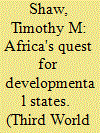

|
|
|
|
|
| Publication |
2012.
|
| Summary/Abstract |
After a generally disappointing half-century since recapturing formal independence, at the turn of the second decade of the 21st century, Africa(s) may now be able to seize unanticipated emerging opportunities to move from `fragile' or `failed' towards `developmental' political economies. The continent displays innovations in terms of sources of finance, new regionalisms & transnational governance leading to distinctive insights for analysis & policy, both state & non-state. Its potential for renaissance is reinforced by South Africa's accession as the fifth of the BRICS at the dawn of the decade.
|
|
|
|
|
|
|
|
|
|
|
|
|
|
|
|
| 2 |
ID:
132953
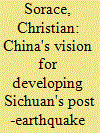

|
|
|
|
|
| Publication |
2014.
|
| Summary/Abstract |
In the aftermath of the 2008 Wenchuan earthquake, government officials, scholars and outside observers eagerly hoped that the emergency relief and reconstruction process would bring about the emergence of civil society and increase grassroots democratic participation. Contrary to this optimistic assessment, this article contends that the local state used the opportunity of the disaster as an experimental laboratory to implement an array of already existing national development plans. The urgency with which the reconstruction was to be completed and the opportunities to meet national development targets as well as access reconstruction funds were too tempting to resist. However, the ham-fisted Leninist implementation style met with local resistance and has contributed to a significant deterioration in local state-society relations. The fact that many local residents continue to question why, despite the huge resources invested by the state in the reconstruction project, they have yet to see any improvement in their economic and overall living conditions points to a deficit of local participation and a breakdown in political communication and trust. By focusing on the different political economies of disaster reconstruction, this article attempts to illuminate the regime's vision for developing the countryside, rural politics, and state-society relations in China more broadly. Unless the state is able to incorporate local needs into its development plans, it will not win the trust and support of local residents, regardless of the amount of money it invests or the benevolence of its intentions.
|
|
|
|
|
|
|
|
|
|
|
|
|
|
|
|
| 3 |
ID:
141478
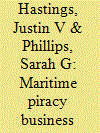

|
|
|
|
|
| Summary/Abstract |
The two regions with the greatest incidence of maritime piracy in Africa, the Horn of Africa and the Gulf of Guinea, are also known for the low quality of the institutions underlying their political economies. This article investigates how institutions in these areas shape and constrain the sophisticated maritime piracy syndicates and their behaviour. Engaging with the literature on state failure and maritime piracy, we argue that norms and institutions constrain even criminal organizations like piracy groups, which often mimic and are embedded in the licit economy. In the Horn of Africa, pirates take structural and ideational cues from the licit economy and are constrained by the informal regulations that govern clan groups, rent-based economic activities, and collective security arrangements in Somalia. In West Africa, sophisticated piracy both preys upon and arises from the formal economy, specifically the international oil industry. As a result, piracy networks often mirror and draw from both the formal institutions in Nigeria used to regulate and protect oil production, and those engaged in oil production, processing, distribution, and transportation.
|
|
|
|
|
|
|
|
|
|
|
|
|
|
|
|
| 4 |
ID:
191772
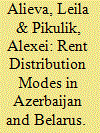

|
|
|
|
|
| Summary/Abstract |
The study uses the theoretical framework of rentier states to compare the political economies of Belarus and Azerbaijan and the differing conditions created for the political opposition. It conducts a comparative analysis of the structural and agency factors affecting these conditions, focusing on the sources, control and the mode of distribution of rents in the two states. While both states combine post-Soviet legacies with rentier economies, they have different sources of rents. The study shows a ‘converging divergence’ of these two rentier states, based on the analysis of their type (pure rentier or semi-rentier state) and demonstrates the role of power transition in determining the distribution of rents. The combination of these variables, in turn, shapes different types of regimes—exclusive patronage in Azerbaijan and inclusive distributive rent-seeking in Belarus—and creates different tasks for the political opposition in terms of ideology and forming Western alliances.
|
|
|
|
|
|
|
|
|
|
|
|
|
|
|
|
| 5 |
ID:
095239
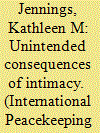

|
|
|
|
|
| Publication |
2010.
|
| Summary/Abstract |
This article assess whether peacekeeping economies are disposed to become sex tourism economies. It argues that, like sex tourism economies, peacekeeping economies are to a greater or lesser degree dependent on the exploitation of women's and girls' sexual labour. The article examines some of the gendered roles and relations that are established or reinforced by peacekeeping economies, and whether these will likely continue beyond the life of the peacekeeping operation. It argues that the similarities between peacekeeping and sex tourism economies are indicative of a possible link between foreign military presence and sex tourism, but also that the UN's position as a political, humanitarian and development actor gives it a special responsibility to prevent this happening.
|
|
|
|
|
|
|
|
|
|
|
|
|
|
|
|
|
|
|
|
|